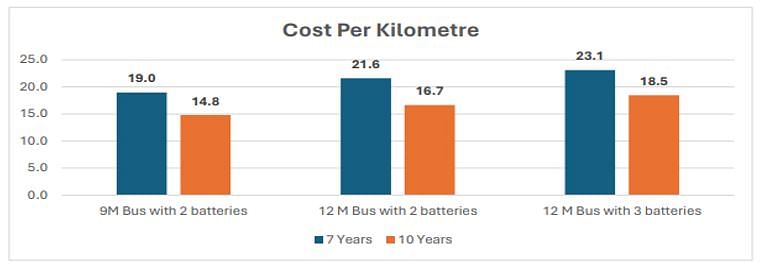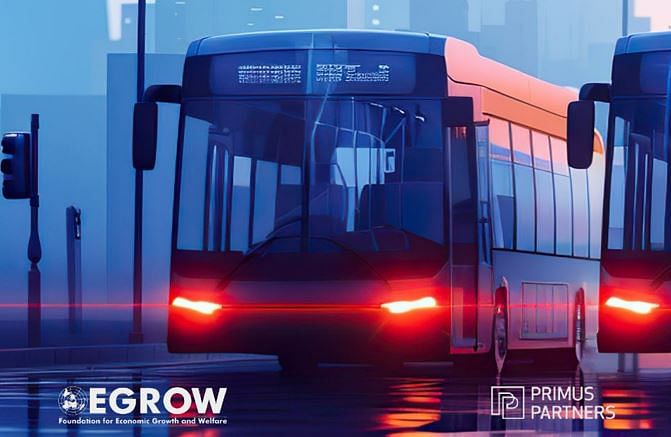Retrofitted 9-meter buses are 32.1% more cost-effective than a new EV bus: EGROW and Primus Partners report

The Foundation for Economic growth and Welfare (EGROW Foundation) - a non-profit, multidisciplinary public policy organisation in collaboration with Primus Partners – India’s leading home-grown consultancy firm – today released a comprehensive study: Retrofitting of Inter-City Diesel Passenger Buses: An Economic Analysis and Policy Prescriptions. The report showcases the economic and environmental incentives of retrofitting diesel-operated buses that contribute heavily to carbon emissions. As per the report, a standard retrofit on a 9-meter bus reduces the cost per kilometre by approximately 34.48% compared to an ICE bus. If India retrofits 20,000 buses annually, it can save about 500,000 tons of diesel and reduce crude oil imports by 12.7 million barrels yearly. The industry can also contribute substantially to India’s goal of creating 30-35 million new green jobs by 2047.
The global e-mobility market has shown significant growth, rising from 2 million vehicles in 2016 to 7.2 million in 2019, reflecting a 30% increase in just three years. The report’s data was gathered by EGROW of industry pilots of bus operations between Mumbai and Pune, a route spanning approximately 150 km. The research focused on the detailed comparison of ICE buses and EVs to evaluate the costs and benefits of EV retrofitting for diesel-operated buses and understand the need for a scaled pilot implementation of EV retrofitting.
Commenting on the findings, Dr. Charan Singh, Chief Executive Office at EGROW Foundation and Mr Davinder Sandhu, Chairperson, Primus Partners in their foreword write, “The economic benefits of this approach are profound, extending beyond mere financial savings to broader economic revitalization and environmental improvements. Retrofitting offers a pragmatic solution, leveraging existing infrastructure while transitioning towards cleaner mobility. It represents a critical step towards sustainable urban transport, demonstrating how innovation and policy alignment can drive tangible progress.”
The joint report notes the number of Indian buses is expected to reach 3 million by 2030, which requires a shift to greener technologies, particularly in pollution-intensive domains like transport. The comprehensive analysis advocates an integrated strategic approach involving policy reforms, financial support from the government and technological advancement to overcome the barriers of retrofitting diesel buses.
Key findings of the report:
-An ICE bus costs more than Rs29/- per km, while an electric one costs Rs28/- per km. In contrast, a 9-metre retrofitted bus costs Rs19/- per km, a 12-metre retrofitted bus with two batteries costs nearly Rs22/- per km and a 12-metre retrofitted bus with three batteries costs marginally more than Rs23/- per km. Thus Retrofitted 9-meter buses are 32.1% more cost-effective than a new EV bus. The 9-metre retrofitted bus is the most economical option.
-Retrofitted buses promise major output on RoI (return on investment). For a 9-metre retrofitted bus with an extended life of 10 years, the cost per km declines to less than Rs15/-. Using the same calculation, the cost per km for a 12-metre bus with two batteries is less than Rs17/- and less than Rs 19/- for a 12m bus with three batteries.

-More than 75% of domestic electricity currently comes from coal-based thermal power. To execute an effective decarbonisation strategy for India’s transport sector, the electricity used in the retrofitted buses must come from renewable sources rather than fossil fuels.
-Retrofitting ICE buses to EVs will create new job opportunities. The state transport undertakings (STUs) employed 640,690 people in 2020-21, with an average of 5.63 employees per bus, including 4.46 traffic staff such as drivers, conductors, and supervisors. Additionally, 84,818 workers involved in repair and maintenance can retain their jobs through reskilling and upskilling. Retrofitting is projected to add 6000-7000 direct jobs and 36,000-42,000 new indirect jobs over the next few years.
Policy recommendations:
- -The findings recommend specific policies to increase retrofitted bus numbers in India. Implementing a scaled pilot project aimed at converting existing ICE buses into EVs across different regions is an important step.
- -Revisiting and modifying the existing vehicle scrapping policy to substantially reduce re-registration fees for retrofitted EV buses will encourage the reuse of older diesel vehicles.
- -The government should subsidise retrofitting of old diesel buses in coordination with state governments, offering State Road Transport Undertakings subsidies to increase the ROI for retrofitting projects.
- -The government should also incorporate retrofitting incentives into the FAME (Faster Adoption and Manufacturing of Electric Vehicles) policy to boost EV adoption.
- -On the monetary side, rebating GST norms for retrofitting vehicles and used components is critical to spreading awareness. State-level Retrofit EV Policies should be introduced to support retrofitting, including interest rate subsidies and charging infrastructure development.
EGROW and Primus Partners extensive report further highlights the necessity of retrofitting diesel buses to electric, amid the changing environmental conditions. Retrofitting of buses offers a cost-effective, environment-friendly transition solution. Implementing the recommended policies and initiatives can accelerate the adoption of EVs in the public transport space. This approach supports India’s broader goals of reducing emissions and enhancing energy security while nurturing innovations in green technologies for a circular economy.

About EGROW
The Foundation for Economic growth and Welfare (EGROW Foundation) is a non-profit, multidisciplinary public policy organisation engaged in independent, high-quality research in the areas of macroeconomic policy, public welfare, national security and diplomacy. Founded with the vision to position the Foundation as a premier think tank globally, contributing to formation of sound public policies, especially in India and in the region, the EGROW Foundation aims to provide research-based support to policy making.
Its objectives include providing a platform for socio-economic policy analysis to foster steady and sustainable growth, generating debate on existing and emerging issues with academia, area specialists and policy makers, and supporting India’s leadership, impact and contribution to global development.
The EGROW Foundation engages in research areas such as Growth and role of public sector, Agriculture and rural development, Banking, financial, fiscal and monetary issues, Population, health and malnutrition, National security and geopolitics, and Skill and entrepreneurship. Among its many activities, the main ones include Research Studies and Working Papers, Research on Policy Issues, Webinars, Seminars and Expert Talk, Education, Trainings and Workshops, and Consultancy in India and abroad.
About Primus Partners Pvt Ltd
Primus Partners Pvt Ltd is a leading management consulting services firm headquartered in New Delhi. Primus provides consulting and advisory services across various industries, including rural management, public policy and industrialization in both public and private sectors. The firm is committed to driving sustainable growth and maximizing value for its clients via innovative approaches and sectoral expertise.
Latest Bus News
View All Bus NewsRecent Posts
- Hyundai Launches Electric Buses in Japanese Market
- NueGo Adds ADAS to Entire Electric Bus Fleet for Safer Travel
- Olectra Greentech to Supply 297 Electric Buses to HRTC
- Tata Bus Price 52 Seater: Latest Models & On-Road Price in India
- Hybrid vs Electric Buses: Which One is Better for Indian Roads?
- Electric School Buses in India 2025: Prices, Brands & How to Choose
- Top Electric Buses in India: Tata, Olectra, & JBM
- Ashok Leyland 38-Seater Bus: Price, Features & Reviews 2025
- Top 5 Electric Buses in India: Price, Range And Popular Brands
- Discover the Top 5 Diesel Buses of 2025 for city transit, staff
Popular Three Wheelers Brands
 Altigreen
Altigreen Montra
Montra Euler Motors
Euler Motors Mahindra
Mahindra Piaggio
Piaggio Bajaj
Bajaj Greaves Mobility
Greaves Mobility ATUL
ATUL TVS
TVS Omega Seiki Mobility
Omega Seiki Mobility Kinetic
Kinetic Lohia
Lohia JSA
JSA YC Electric
YC Electric Udaan
Udaan SN Solar Energy
SN Solar Energy Saarthi
Saarthi Teja (Powered by Greaves)
Teja (Powered by Greaves) Jezza Motors
Jezza Motors GreenRick
GreenRick City Life Electric
City Life Electric Ampere
Ampere Baba Electric
Baba Electric E-Ashwa
E-Ashwa Bahubali E Rickshaw
Bahubali E Rickshaw Dabang
Dabang Deltic
Deltic Keto Motors
Keto Motors Mini Metro
Mini Metro Gayam Motors
Gayam Motors Gem EV
Gem EV Gkon Automotive
Gkon Automotive Skyride
Skyride Thukral Electric
Thukral Electric Baxy
Baxy Eblu
Eblu Hexall Motors
Hexall Motors Joy E-Rik
Joy E-Rik Star
Star Dandera
Dandera EKA
EKA Khalsa
Khalsa Hero
Hero- Zero21
 Sodyco
Sodyco Speego
Speego- Wasan e-Mobility
 Raftaar Electric
Raftaar Electric Zen Mobility
Zen Mobility- Rajhans
 Zelio
Zelio Rayon Engineers
Rayon Engineers Vani Moto
Vani Moto Om Raj Autotech
Om Raj Autotech Victory
Victory Sniper Electric
Sniper Electric Veectero
Veectero Vande Bharat
Vande Bharat OPG Mobility
OPG Mobility Top Team Machines
Top Team Machines- Shaktimaan E-Rickshaw
 Singham
Singham Triton EV
Triton EV Panther
Panther- Terra Motors
 OK Play
OK Play Tejas Vehicles
Tejas Vehicles Supertech EV
Supertech EV Syndicate Motors
Syndicate Motors SuperEco
SuperEco Shakti Auto Green
Shakti Auto Green Star Bull
Star Bull Sathi
Sathi Statix Electric
Statix Electric Om Balajee Automobiles
Om Balajee Automobiles Savy Electric
Savy Electric Sargam E Ride
Sargam E Ride NRJ
NRJ Speedways Electric
Speedways Electric Kuku Automotives
Kuku Automotives Komaki
Komaki Kaptech India
Kaptech India JPS
JPS JS Mobileon
JS Mobileon- Jangid
 Jitendra
Jitendra Indo Wagen
Indo Wagen- Janaasha EV
 Hooghly Motors
Hooghly Motors Hykon India
Hykon India Hyundai Motors
Hyundai Motors Him Teknoforge
Him Teknoforge Grevol
Grevol Godawari
Godawari Gopal Auto Motors
Gopal Auto Motors
91trucks is a rapidly growing digital platform that offers the latest updates and comprehensive information about the commercial vehicle industry.









